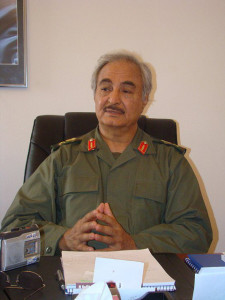
Although he was not listed as a topic of conversation in Vienna this week, Khalifa Haftar, commander of the Libyan National Army, will have been at the forefront of many officials’ minds; he remains one of the most intransigent sticking points which is preventing political re-unification.
Italian Foreign Minister Paolo Gentiloni stated on 9 May that Khalifa Haftar was an essential part of Libya’s future, but only if he would submit to GNA oversight. This does not seem likely.
Khalifa Haftar refused to meet with Kobler on 9 May — saying that he was too busy preparing for the LNA’s battle in Sirte — and added that he had lost trust in Kobler because the UN had not recognised the LNA as Libya’s national army, and had refused to lift the arms embargo on him.
The US in particular appeared exasperated with the delays in re-unifying the country, and largely blames House Speaker Aguila Saleh for his efforts to press for Khalifa Haftar and the LNA to retain influence over Libya’s future.
On 13 May — echoing growing domestic resentment of House inaction — the US Treasury Department joined the EU in levying sanctions against Saleh for undermining the GNA. Saleh was defiant, saying that the sanctions would not compel him to change his behaviour and issuing a new decree ordering eastern Prime Minister Abdullah Al-Thani and his rival government to continue working. Nominated defence minister Mahdi al-Barghathi went to Benghazi on 14 May to try to smooth things over, insisting that he only accepted the nomination to help unite the country, and vowing that he would never betray the memory of LNA martyrs who died fighting extremists.
Last week there were several meetings of community elders after which there were many conditional statements calling for unity at this fragile time. Benghazi elders and a group of Federalists said that they would support the GNA and al-Barghathi, as soon as the House approves. But, for most of these eastern groups, support for Khalifa Haftar and the LNA is a given.
Momentum against any re-unification is also present in the west. Grand Mufti Sadiq al-Ghariani publicly stated that militia fighters should divert attention from fighting IS in Abu Grein to concentrate on the fight against Khalifa Haftar in Benghazi. Presumably this would be fighting alongside the Benghazi Revolutionaries Shura Council (BRSC) which is suspected of coordinating with, and even fighting alongside, IS in the city.
At the Vienna ministerial meeting the leaders must therefore think creatively about how to find a middle ground between these two positions. On the one hand they must acknowledge that Khalifa Haftar is an important part of Libya’s security landscape and offer him a controllable position in Libya’s future that he is willing to accept. At the same time, however, they must quell Islamist fears he represents the resurgence of Qadhafi-era repression.
Improving security in Libya: Western states, and especially the US, w push for the lifting of the UN arms embargo on Libya, but limiting arms transfers to This would allow the Presidency Council to gain leverage against Khalifa Haftar who is already receiving arms from the UAE, Egypt, and possibly Saudi Arabia, in defiance of the embargo. But, because the Presidency Council has no control over the militias that claim to support it, lifting the embargo could exacerbate militia-caused instability…
This article was taken form our Libya Politics & Security paper – if you would like to discuss the contents of this article, or the nature of your business in Libya, further with our consultancy team then contact us here.



